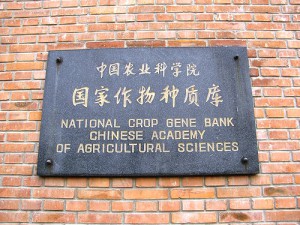- Seed savers: everyone’s got an angle, from Seeds of Hope and Change to Seed Bank Bingo.
- Italian lemons enjoying a renaissance. In California, natch.
- India registers Assam farmers’ traditional rice varieties. In other news, rice water “is also used as shampoo, according to community elders”.
- US$9 million to “implement and evaluate four approaches” to controlling Striga in Africa. One day we’ll know.
- Denver Botanic Gardens does amaranth.
- Evolution of bearded pigs. Good to know. Good to eat?
- Bioversity banana team guest blogs at Annals of Botany. But surely they have a blog of their own. No, wait…
- Agriculture is bad for your health.
Brainfood: Soil, Seed aging, Organic sustainability, Yaquis, Garlic, Rice bean, Ethiopian livestock, Sweet potato intercropping, PES
- Long-term effect of tillage, nitrogen fertilization and cover crops on soil organic carbon and total nitrogen content. No till is better than conservation tillage.
- Catalase is a key enzyme in seed recovery from ageing during priming. It sure is. Good to know.
- Sustainable agriculture: A case study of a small Lopez Island farm. The authors conclude: “the need for future targeted nutrient inputs cannot be ruled out for sustainable long-term production”.
- Evolution of the knowledge system for agricultural development in the Yaqui Valley, Sonora, Mexico. They’re innovative, and diversity promotes agility.
- Changes in phenolic compounds in garlic (Allium sativum L.) owing to the cultivar and location of growth. Don’t hold your breath; only 10 varieties.
- Morpho-physiological and nutritional characterization of rice bean (Vigna umbellata). Now that’s what I call science; 30 varieties.
- Rural livestock asset portfolio in northern Ethiopia: a microeconomic analysis of choice and accumulation. Many, many factors come into play.
- Sweet potato (Ipomoea batatas L.)-based strip intercropping: I. Interspecific interactions and yield advantage. Almost every intercrop improves yield and bottom line.
- Should payments for biodiversity conservation be based on action or results? A model says: “It depends.”
China establishes (another) national genebank
China established its first national gene bank on Friday in south China’s city of Shenzhen with the support of the Beijing Genomics Institute (BGI), officials said. With the establishment of the National Gene Bank in Shenzhen, China will be able to better protect, research and utilize its precious genetic resources, boosting the genetics industry and safeguarding the country’s genetic information, said Qi Chengyuan, head of the high-tech industry department of the National Development and Reform Committee (NDRC).
 Eh? What does that make CAAS’s National Crop Gene Bank? And the genebank at the Kunming Institute of Botany, China’s largest, apparently? What are they? Chopped liver? 1
Eh? What does that make CAAS’s National Crop Gene Bank? And the genebank at the Kunming Institute of Botany, China’s largest, apparently? What are they? Chopped liver? 1
Genebank bubble indeed.
Collecting to restore
We blogged recently about the huge fire in Arizona and what it may be doing to crop wild relatives. In southern California, however, they’re doing something more than just wringing their hands with worry. They’re going out and collecting seeds, that could later be used for restoration, as part of a project called Seeds of Success.
Once back at Rancho Santa Ana, the team dries the seeds in their paper bags, boxes them up and sends them to the national Bend Seed Extractory in Bend, Ore. There they are sorted and X-rayed to see whether they are viable, and then scientists go to work trying to find out how to get them to germinate.
…
Part of each seed lot is stored at the U.S. National Seed Bank as an insurance policy against future threats such as climate change, and some go to native plant researchers with the U.S. Department of Agriculture. The trove also is shared with the Kew Millennium Seed Bank operated by the Royal Botanic Garden in England, which aims to save 25 percent of the world’s plant species by 2020.
In some mountain areas, they’ll really have to hurry.
Nibbles: Deforestation, Adaptation
- Poverty doesn’t drive deforestation. Discuss using examples from Kenya and China.
- Crop Science Society of America (CSSA) position statement on “Crop Adaptation to Climate Change.” Genebanks mentioned. Crop wild relatives mentioned. Information systems mentioned. One’s cup runneth over.